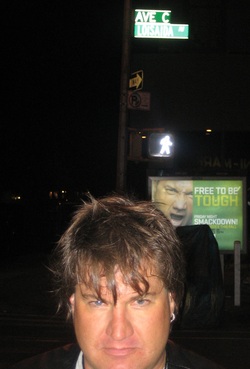
A shock to the academic community, and those friends and family closest to him, his premature departure at 46 has left a sudden hole in the lives of many. Students devoted to his ‘fun’, ‘interesting’ and ‘cool’ teaching style, and the way he ‘keeps it real’, were left with confusion and sadness when he didn’t show up to teach his criminology lecture at Berkeley College on Monday. His glowing reviews on ratemyprofessor.com reveal that he influenced a generation of young scholars in the fields of sociology, anthropology, criminology and drug research.
And the regulars at Bar 169 surely felt the physical absence of ‘the Professor’ that Monday night. Tucked away in the backroom of the bar, I, myself, mourned the loss of someone, who, a decade earlier, would undoubtedly alter the course of my life and career.
Friends first, we spent many an afternoon riding bikes, eating out in Chinatown, or going to see free concerts in the park, such as George Clinton and Patti Smith. But Dr Steve would also go on to be an influential mentor and colleague over the years. In 2005, he was the second reader on my Master’s thesis in Anthropology at Hunter College, CUNY. And in 2006, he introduced me to the Society for the Study of Social Problems (SSSP), an organization and annual conference that would see us present on similar panels in Montreal, NYC, Las Vegas and Denver. He gave useful comments on my PhD dissertation, he graces the acknowledgements of my new book (Sex, Love and Money in Cambodia), and he invited me to guest lecture in his class at Berkeley College. And it is also thanks to Steve that I was first introduced to the National Development and Research Institutes (NDRI) several years back—which is where I currently hold my own postdoctoral fellowship.
Known for his PhD research at CUNY Graduate Center on cannabis use and sales in NYC and Rotterdam, Dr Steve also did extensive ethnographic research through NDRI on drug users, drug markets and subcultures, with a focus on global marijuana users and retailers, heroin-using lap dancers in NYC, and Mexican drug gangs and sex workers. At Berkeley, he was currently doing comparative work on global drug policy.
During his post at NDRI, he published several papers with Eloise Dunlap, Charles Kaplan, Sam Friedman, Andrew Golub, Ellen Benoit and the late Bruce Johnson, to name a few. And in 2009, Dr Steve and his co-authors (Johnson, Golub, and Dunlap) were winners of the Outstanding Paper Award from Jim Walther for the paper titled An Analysis of Alternatives to New York City’s Current Marijuana Arrest and Detention Policy, (Policing: An International Journal of Police Strategies & Management, 2008). The article was chosen by the editorial team as the journal’s most impressive piece of the year. In addition to his faculty post at Berkeley College, he lectured extensively within the CUNY system, at Hunter College, John Jay, and College of Staten Island.
There will be a gap in the program at this year’s 63rd Annual SSSP Conference, taking place in August in New York City, where he was set to present at, and chair a panel titled ‘Global Innovations in Drug Policy’. It was during this same conference in NY in 2007 that Steve led informal tours of notorious historical drug spots in downtown NYC, which was yet another opportunity to flaunt his extensive subcultural drug knowledge. This was the Steve those closest to him knew and loved, as he lived life like an ethnography--an ongoing project of life on the edge.
His passing far too soon and sudden, memories of Dr Steve and his important contributions will echo in the halls of sociology and criminology departments for decades to come. Scholar, teacher, mentor, friend…the Professor will be missed.

 RSS Feed
RSS Feed